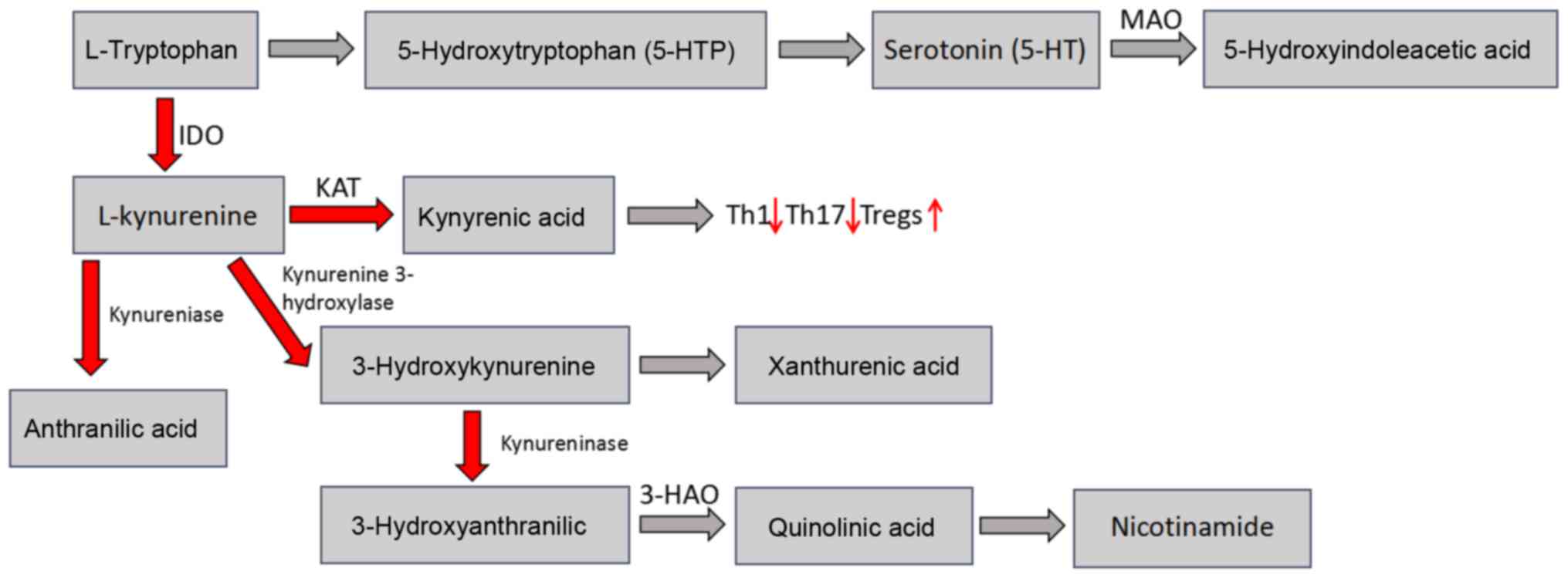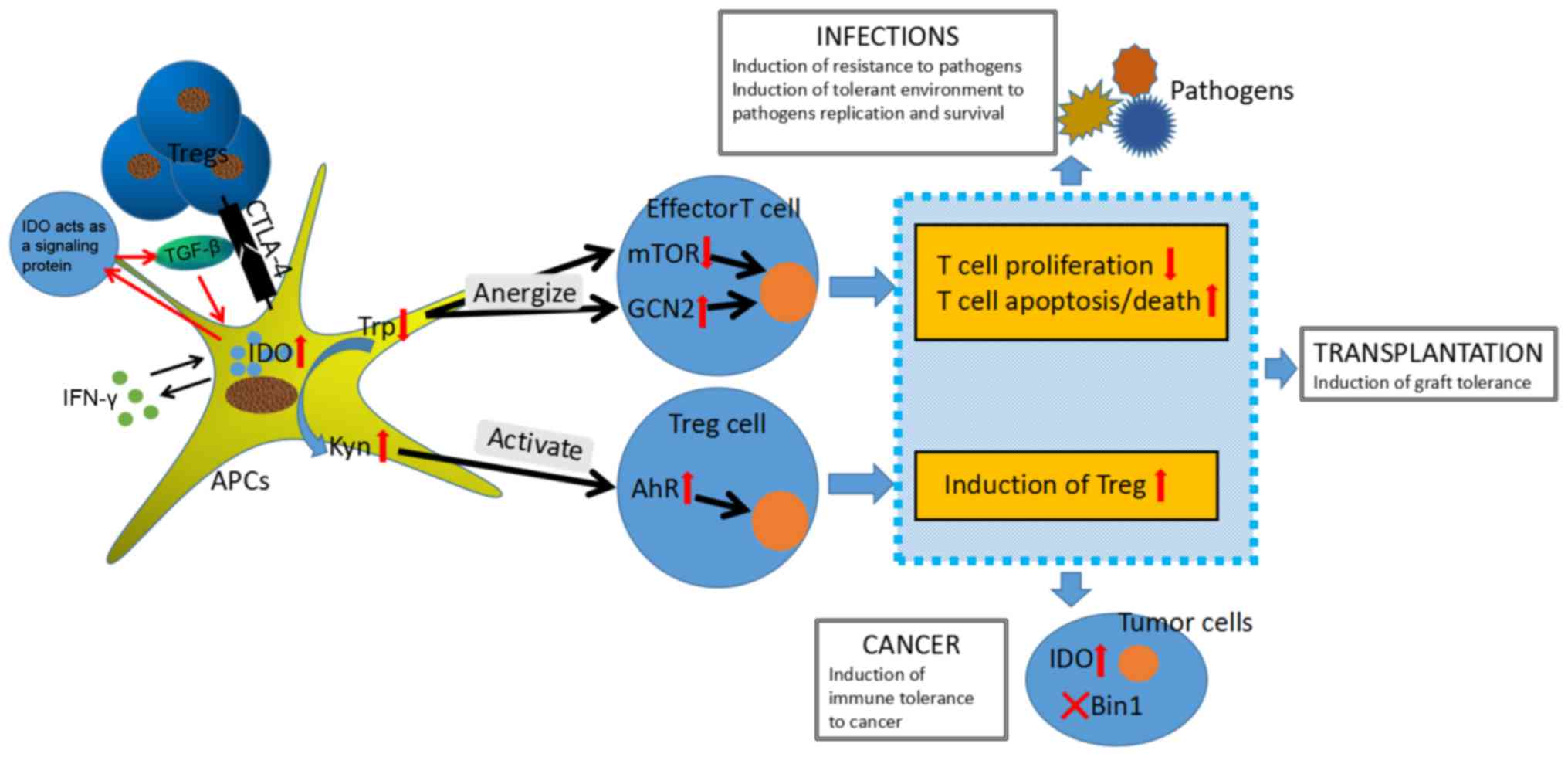|
1
|
Munn DH: Indoleamine 2,3-dioxygenase,
Tregs and cancer. Curr Med Chem. 18:2240–2246. 2011. View Article : Google Scholar : PubMed/NCBI
|
|
2
|
Gerriets VA and Rathmell JC: Metabolic
pathways in T cell fate and function. Trends Immunol. 33:168–73.
2012. View Article : Google Scholar : PubMed/NCBI
|
|
3
|
Munn DH, Zhou M, Attwood JT, Bondarev I,
Conway SJ, Marshall B, Brown C and Mellor AL: Prevention of
allogeneic fetal rejection by tryptophan catabolism. Science.
281:1191–1193. 1998. View Article : Google Scholar : PubMed/NCBI
|
|
4
|
Ciorba MA, Bettonville EE, McDonald KG,
Metz R, Prendergast GC, Newberry RD and Stenson WF: Induction of
IDO-1 by immunostimulatory DNA limits severity of experimental
colitis. J Immunol. 184:3907–3916. 2010. View Article : Google Scholar : PubMed/NCBI
|
|
5
|
Mbongue JC, Nicholas DA, Torrez TW, Kim
NS, Firek AF and Langridge WH: The Role of indoleamine 2,
3-dioxygenase in immune suppression and autoimmunity. Vaccines
(Basel). 3:703–729. 2015. View Article : Google Scholar : PubMed/NCBI
|
|
6
|
Prendergast GC, Smith C, Thomas S,
Mandik-Nayak L, Laury-Kleintop L, Metz R and Muller AJ: Indoleamine
2,3-dioxygenase pathways of pathogenic inflammation and immune
escape in cancer. Cancer Immunol Immunother. 63:721–735. 2014.
View Article : Google Scholar : PubMed/NCBI
|
|
7
|
Trabanelli S, Ocadlikova D, Evangelisti C,
Parisi S and Curti A: Induction or regulatory T Cells by dendritic
cells through indoleamine 2,3-dioxygenase: A potent mechanism of
acquired peripheral tolerance. Curr Med Chem. 18:2234–2239. 2011.
View Article : Google Scholar : PubMed/NCBI
|
|
8
|
Huang L, Baban B, Johnson BA and Mellor
AL: Dendritic cells, indoleamine 2,3 dioxygenase and acquired
immune privilege. Int Rev Immunol. 29:133–155. 2010. View Article : Google Scholar : PubMed/NCBI
|
|
9
|
Ball HJ, Sanchez-Perez A, Weiser S, Austin
CJ, Astelbauer F, Miu J, McQuillan JA, Stocker R, Jermiin LS and
Hunt NH: Characterization of an indoleamine 2,3-dioxygenase-like
protein found in humans and mice. Gene. 396:203–213. 2007.
View Article : Google Scholar : PubMed/NCBI
|
|
10
|
Poormasjedi-Meibod MS, Jalili RB,
Hosseini-Tabatabaei A, Hartwell R and Ghahary A: Immuno-Regulatory
Function of Indoleamine 2,3 Dioxygenase through Modulation of
Innate Immune Responses. PLoS One. 8:e710442013. View Article : Google Scholar : PubMed/NCBI
|
|
11
|
Munn DH and Mellor AL: Indoleamine 2,3
dioxygenase and metabolic control of immune responses. Trends
Immunol. 34:137–143. 2013. View Article : Google Scholar : PubMed/NCBI
|
|
12
|
Nguyen NT, Kimura A, Nakahama T, Chinen I,
Masuda K, Nohara K, Fujii-Kuriyama Y and Kishimoto T: Aryl
hydrocarbon receptor negatively regulates dendritic cell
immunogenicity via a kynurenine-dependent mechanism. Proc Natl Acad
Sci USA. 107:pp. 19961–19966. 2010; View Article : Google Scholar : PubMed/NCBI
|
|
13
|
Sundrud MS, Koralov SB, Feuerer M, Calado
DP, Kozhaya AE, Rhule-Smith A, Lefebvre RE, Unutmaz D, Mazitschek
R, Waldner H, et al: Halofuginone inhibits TH17 cell
differentiation by activating the amino acid starvation response.
Science. 324:1334–1338. 2009. View Article : Google Scholar : PubMed/NCBI
|
|
14
|
Baban B, Chandler PR, Johnson BA, Huang L,
Li M, Sharpe ML, Francisco LM, Sharpe AH, Blazar BR, Munn DH, et
al: Physiologic control of IDO competence in splenic dendritic
cells. J Immunol. 187:2329–2335. 2011. View Article : Google Scholar : PubMed/NCBI
|
|
15
|
Smith C, Chang MY, Parker KH, Beury DW, Du
Hadaway JB, Flick HE, Boulden J, Sutanto-Ward E, Soler AP,
Laury-Kleintop LD, et al: IDO Is a nodal pathogenic driver of lung
cancer and metastasis development. Cancer Discov. 2:722–735. 2012.
View Article : Google Scholar : PubMed/NCBI
|
|
16
|
Chaudhary K, Shinde R, Liu H,
Gnana-Prakasam JP, Veeranan-Karmegam R, Huang L, Ravishankar B,
Bradley J, Kvirkvelia N, McMenamin M, et al: Amino acid metabolism
inhibits antibody-driven kidney injury by inducing autophagy. J
Immunol. 194:5713–5724. 2015. View Article : Google Scholar : PubMed/NCBI
|
|
17
|
Chuang HC, Lan JL, Chen DY, Yang CY, Chen
YM, Li JP, Huang CY, Liu PE, Wang X and Tan TH: The kinase GLK
controls autoimmunity and NF-κB signaling by activating the kinase
PKC-θ in T cells. Nat Immunol. 12:1113–1138. 2011. View Article : Google Scholar : PubMed/NCBI
|
|
18
|
Metz R, Rust S, Duhadaway JB, Mautino MR,
Munn DH, Vahanian NN, Link CJ and Prendergast GC: IDO inhibits a
tryptophan sufficiency signal that stimulates mTOR: A novel IDO
effector pathway targeted by D-1-methyl-tryptophan. Oncoimmunology.
1:1460–1468. 2012. View Article : Google Scholar : PubMed/NCBI
|
|
19
|
Zaher SS, Germain C, Fu H, Larkin DF and
George AJ: 3-Hydroxykynurenine suppresses CD4+ T-cell
proliferation, induces T-regulatory-cell development, and prolongs
corneal allograft survival. Investig. Invest Ophthalmol Vis Sci.
52:2640–2648. 2011. View Article : Google Scholar : PubMed/NCBI
|
|
20
|
Hao K, Zhou Q, Chen W, Jia W, Zheng J,
Kang J, Wang K and Duan T: Possible role of the ‘IDO-AhR axis’ in
maternal-foetal tolerance. Cell Biol Int. 37:105–108. 2013.
View Article : Google Scholar : PubMed/NCBI
|
|
21
|
Pilotte L, Larrieu P, Stroobant V, Colau
D, Dolusic E, Frédérick R, De Plaen E, Uyttenhove C, Wouters J,
Masereel B and Van den Eynde BJ: Reversal of tumoral immune
resistance by inhibition of tryptophan 2,3-dioxygenase. Proc Natl
Acad Sci USA. 109:pp. 2497–2502. 2012; View Article : Google Scholar : PubMed/NCBI
|
|
22
|
DiNatale BC, Murray IA, Schroeder JC,
Flaveny CA, Lahoti TS, Laurenzana EM, Omiecinski CJ and Perdew GH:
Kynurenic acid is a potent endogenous aryl hydrocarbon receptor
ligand that synergistically induces interleukin-6 in the presence
of inflammatory signaling. Toxicol Sci. 115:89–97. 2010. View Article : Google Scholar : PubMed/NCBI
|
|
23
|
Pallotta MT, Orabona C, Volpi C, Vacca C,
Belladonna ML, Bianchi R, Servillo G, Brunacci C, Calvitti M,
Bicciato S, et al: Indoleamine 2,3-dioxygenase is a signaling
protein in long-term tolerance by dendritic cells. Nat Immunol.
12:870–878. 2011. View
Article : Google Scholar : PubMed/NCBI
|
|
24
|
Tas SW, Vervoordeldonk MJ, Hajji N,
Schuitemaker JH, van der Sluijs KF, May MJ, Ghosh S, Kapsenberg ML,
Tak PP and de Jong EC: Noncanonical NF-kappaB signaling in
dendritic cells is required for indoleamine 2,3-dioxygenase (IDO)
induction and immune regulation. Blood. 110:1540–1549. 2007.
View Article : Google Scholar : PubMed/NCBI
|
|
25
|
Romani L, Fallarino F, De Luca A,
Montagnoli C, D'Angelo C, Zelante T, Vacca C, Bistoni F, Fioretti
MC, Grohmann U, et al: Defective tryptophan catabolism underlies
inflammation in mouse chronic granulomatous disease. Nature.
451:211–215. 2008. View Article : Google Scholar : PubMed/NCBI
|
|
26
|
Matteoli G, Mazzini E, Iliev ID, Mileti E,
Fallarino F, Puccetti P, Chieppa M and Rescigno M: Gut CD103+
dendritic cells express indoleamine 2,3-dioxygenase which
influences T regulatory/T effector cell balance and oral tolerance
induction. Gut. 59:595–604. 2010. View Article : Google Scholar : PubMed/NCBI
|
|
27
|
Sharma MD, Hou DY, Liu Y, Koni PA, Metz R,
Chandler P, Mellor AL, He Y and Munn DH: Indoleamine
2,3-dioxygenase controls conversion of Foxp3? Tregs to TH17-like
cells in tumor-draining lymph nodes. Blood. 113:6102–6111. 2009.
View Article : Google Scholar : PubMed/NCBI
|
|
28
|
Chung DJ, Rossi M, Romano E, Ghith J, Yuan
J, Munn DH and Young JW: Indoleamine 2,3-dioxygenase-expressing
mature human monocyte-derived dendritic cells expand potent
autologous regulatory T cells. Blood. 114:555–563. 2009. View Article : Google Scholar : PubMed/NCBI
|
|
29
|
Thaker AI, Rao MS, Bishnupuri KS, Kerr TA,
Foster L, Marinshaw JM, Newberry RD, Stenson WF and Ciorba MA: IDO1
metabolites activate beta-catenin signaling to promote cancer cell
proliferation and colon tumorigenesis in mice. Gastroenterology.
145:416–425.e1-4. 2013. View Article : Google Scholar : PubMed/NCBI
|
|
30
|
Ferns DM, Kema IP, Buist MR, Nijman HW,
Kenter GG and Jordanova ES: Indoleamine-2,3-dioxygenase (IDO)
metabolic activity is detrimental for cervical cancer patient
survival. Oncoimmunology. 4:e9814572015. View Article : Google Scholar : PubMed/NCBI
|
|
31
|
Johnson TS, Munn DH and Maria BL:
Modulation of tumor tolerance in primary central nervous system
malignancies. Clin Dev Immunol. 2012:9372532012. View Article : Google Scholar : PubMed/NCBI
|
|
32
|
Munn DH and Mellor AL: IDO and tolerance
to tumors. Trends Mol Med. 10:15–18. 2004. View Article : Google Scholar : PubMed/NCBI
|
|
33
|
Palucka K, Banchereau J and Mellman I:
Designing vaccines based on biology of human dendritic cell
subsets. Immunity. 33:464–478. 2010. View Article : Google Scholar : PubMed/NCBI
|
|
34
|
Brandacher G, Cakar F, Winkler C,
Schneeberger S, Obrist P, Bösmüller C, Werner-Felmayer G, Werner
ER, Bonatti H, Margreiter R and Fuchs D: Non-invasive monitoring of
kidney allograft rejection through IDO metabolism evaluation.
Kidney Int. 71:60–67. 2007. View Article : Google Scholar : PubMed/NCBI
|
|
35
|
Sun X, Gong ZJ, Wang ZW, Li T, Zhang JY,
Sun HC, Liu S, Huang L, Huang C and Peng ZH: IDO-Competent-DCs
induced by IFN-γ attenuate acute rejection in rat liver
transplantation. J Clin Immunol. 32:837–847. 2012. View Article : Google Scholar : PubMed/NCBI
|
|
36
|
Xie FT, Cao JS, Zhao J, Yu Y, Qi F and Dai
XC: IDO expressing dendritic cells suppress allograft rejection of
small bowel transplantation in mice by expansion of Foxp3+
regulatory T cells. Transpl Immunol. 33:69–77. 2015. View Article : Google Scholar : PubMed/NCBI
|
|
37
|
Liu WL, Lin YH, Xiao H, Xing S, Chen H,
Chi PD and Zhang G: Epstein-Barr virus infection induces
indoleamine 2, 3-dioxygenase expression in human monocyte-derived
macrophages through p38/mitogen-activated protein kinase and NF-κB
pathways: Impairment in T cell functions. J Virol. 88:6660–6671.
2014. View Article : Google Scholar : PubMed/NCBI
|
|
38
|
Schulz S, Landi A, Garg R, Wilson JA and
van Drunen Littel-van den Hurk S: Indolamine 2,3-dioxygenase
expression by monocytes and dendritic cell populations in hepatitis
C patients. Clin Exp Immunol. 180:484–498. 2015. View Article : Google Scholar : PubMed/NCBI
|
|
39
|
Yoshio S, Sugiyama M, Shoji H, Mano Y,
Mita E, Okamoto T, Matsuura Y, Okuno A, Takikawa O, Mizokami M and
Kanto T: Indoleamine-2,3-dioxygenase as an effector and an
indicator of protective immune responses in patients with acute
hepatitis B. Hepatology. 63:83–94. 2016. View Article : Google Scholar : PubMed/NCBI
|
|
40
|
Donovan MJ, Tripathi V, Favila MA, Geraci
NS, Lange MC, Ballhorn W and McDowell MA: Indoleamine
2,3-dioxygenase (IDO) induced by Leishmania infection of human
dendritic cells. Parasite Immunol. 34:464–472. 2012. View Article : Google Scholar : PubMed/NCBI
|
|
41
|
Sage LK, Fox JM, Mellor AL, Tompkins SM
and Tripp RA: Indoleamine 2,3-dioxygenase (IDO) activity during the
primary immune response to influenza infection modifies the memory
T Cell response to influenza challenge. Viral Immunol. 27:112–123.
2014. View Article : Google Scholar : PubMed/NCBI
|
|
42
|
Planès R and Bahraoui E: HIV-1 Tat protein
induces the production of IDO in human monocyte derived-dendritic
cells through a direct mechanism: Effect on T cells proliferation.
PLoS One. 8:e745512013. View Article : Google Scholar : PubMed/NCBI
|
|
43
|
Page EE, Greathead L, Metcalf R, Clark SA,
Hart M, Fuchs D, Pantelidis P, Gotch F, Pozniak A, Nelson M, et al:
Loss of Th22 cells is associated with increased immune activation
and IDO-1 activity in HIV-1 infection. J Acquir Immune Defic Syndr.
67:227–235. 2014. View Article : Google Scholar : PubMed/NCBI
|
|
44
|
Moon YW, Hajjar J, Hwu P and Naing A:
Targeting the indoleamine 2,3-dioxygenase pathway in cancer. J
Immunother Cancer. 3:512015. View Article : Google Scholar : PubMed/NCBI
|
|
45
|
Andersen MH: The specific targeting of
immune regulation: T-cell responses against Indoleamine
2,3-dioxygenase. Cancer Immunol Immunother. 6:1289–1297. 2012.
View Article : Google Scholar
|
|
46
|
Sharma MD, Hou DY, Baban B, Koni PA, He Y,
Chandler PR, Blazar BR, Mellor AL and Munn DH: Reprogrammed
foxp3(+) regulatory T cells provide essential help to support
cross-presentation and CD8(+) T cell priming in naive mice.
Immunity. 33:942–954. 2010. View Article : Google Scholar : PubMed/NCBI
|
















